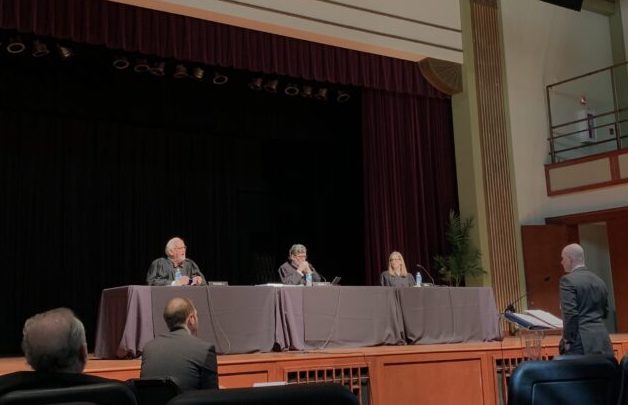On Wednesday, Tennesse’s Court of Criminal Appeals came to campus to hold three separate appeals cases. Collins Alumni Auditorium transformed into a real courtroom for a few hours while cases were heard.
The clerk opened by telling the audience that the Court was grateful for the opportunity to hold court at Lipscomb University. Although the Court of Appeals usually hears cases in specific courtrooms in Jackson, Knoxville and Nashville, they also travel in order to be more accessible to other members of the communities.
The Court of Appeals differs from the court dealings one usually sees on television. Whereas typically both sides present their full case, call witnesses, and present evidence, none of that happens in a court of appeals. In fact, there is not even a decision made at the conclusion.
A case goes to the Court of Appeals after it has already received a ruling from a trial court. Instead of seeking a ruling, the appellant, or the person bringing the case, is asking for something to be corrected.
Most of the lawyers on Wednesday were seeking a new trial for their client, proposing that something went wrong the first time.
The Court of Appeals also differs by instead of having just one judge, there are several, who have all been appointed to their position.
Judges John Everett Williams, Timothy L. Easter and Jill Bartee Ayers presided over the court. It began promptly at 9 am with the clerk announcing the judges and stating the common “Oyez, oyez, oyez.”
The first case, State Of Tennessee V. Vana Mustafa, dealt with a 17-year-old convicted of first-degree murder that took place during a drug deal. The Appellant argued that the lawyer of the defendant was inadequate and that a new trial should be conducted.
The second case, State of Tennessee V. Amanda L. Moore, was brought by a woman charged with Vehicular Assault who claims she was driving drowsy while her Blood Alcohol Levels said otherwise.
The final case of the day, State of Tennessee V. Antonio Maurice Jackson, was another murder case. The Appellant was found guilty of Second-Degree Murder; the lawyer argued for a new trial since he found the first trial to be conducted unfairly.
Each lawyer was given 20 minutes, except for one who was granted an additional 10 minutes, to give their case and answer any questions from the Judges.
The opinions will be released on the Court’s website after the Judges have time to deliberate, reach an opinion, and draft their response.
The crowd was a mix of attentive students, teachers, and community members. The Judges further engaged by answering questions from students and then holding a luncheon for a smaller number of staff and students.
The Court of Appeals holding trials on campus was a rare opportunity that gave students easy access to see a functioning court that makes up their judicial system.

